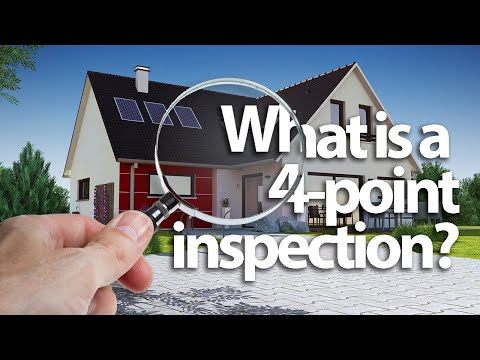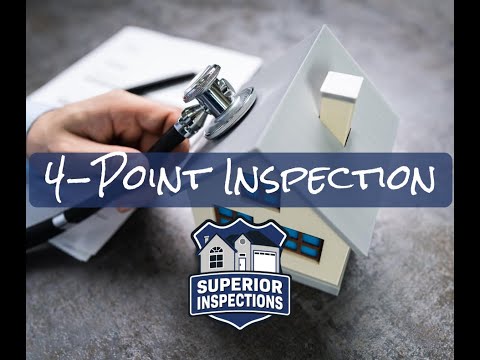Navigating the treacherous waters of homeownership can be akin to sailing the high seas—exciting, overwhelming, and unpredictable. One of the most crucial anchors in this journey is understanding and successfully navigating the 4 point inspection.

Navigating the 4 Point Inspection: A Homeowner’s Guide
Understanding the Basics of a 4 Point Inspection
Let’s peel back the layers to understand what a 4 point inspection involves. It’s like having a financial health check for your house, covering the roof, electrical system, plumbing, and HVAC—basically, the home’s essential organs. It’s a snapshot of these systems’ condition signaling if they’re fit as a fiddle or ticking time bombs.
Historically, this process has evolved as lenders and insurers tightened their belts, aiming to mitigate risks. And just like you wouldn’t hide your medical history from your doctor, insurers require this full disclosure to safeguard their investment—and yours.
Why do insurers insist on a 4 point inspection, you ask? Well, it’s like playing detective to predict the future of your home’s well-being. They’re playing it safe, and so should you.

The Importance of 4 Point Inspections for Home Insurance
Did you know that a 4 point inspection can play a starring role in influencing your insurance premiums? Insurers weigh the risk of insuring your abode based on this critical exam. The sturdier and safer the systems, the lower the risk—and potentially, your premiums.
It’s not just about ticking boxes. Insurers dissect your inspection report to assess how much of a safe bet your house is. Think of it as your home’s resume.
Real homeowners have felt the financial sting or relief of these inspections firsthand. Some have seen premiums slash, while others have had to dig deeper into their pockets.

| Category | Details |
|---|---|
| Definition | An assessment of a home’s four major systems: roofing, electrical, plumbing, and HVAC, used to provide homeowners insurance companies with information on a property’s condition. |
| Purpose | To identify the current condition and potential issues or hazards within the four major systems of a home, often used by insurers to decide on policy approvals or rates for older homes. |
| Typical Cost | Around $125 for service areas covered by the provider. |
| Systems Covered | – Roof – Electrical – Plumbing – HVAC |
| Roof Inspection | Evaluates the age, material, condition, and remaining life expectancy of the roofing system. |
| Electrical Inspection | Assesses the electrical panel, wiring, outlets, and safety features to ensure they meet current safety standards. |
| Plumbing Inspection | Inspects the pipes, faucets, water heater, and toilets for leaks, proper function, and compliance with current codes. |
| HVAC Inspection | Reviews the condition and functionality of heating, ventilation, and air conditioning units. |
| Homes Targeted | Primarily homes more than 30 years old, although criteria may vary by insurance company. |
| Requesting Party | Usually the insurance provider, but can also be requested by homebuyers or sellers. |
| Benefits | Helps homeowners understand potential risks, can facilitate the insurance purchasing process, and may reveal necessary repairs for maintaining home safety and integrity. |
| Author & Reading Time | Victoria Araj, 6-minute read. |
| Publish Date | October 23, 2023. |
| Relevance of Inspection | Insights from a 4-point inspection can impact homeowner insurance policy approval and pricing, especially for homes over 30 years old. |
Mastering the Preparation for Your 4 Point Inspection in Florida
Now, for my Florida friends, it’s essential to understand that the Sunshine State has its unique challenges—hello, humidity and hurricanes! This means being extra vigilant about the specifics when prepping for a 4 point inspection Florida style.
What about DIY versus calling in the pros? Going DIY might save you some bucks upfront, but missing a critical flaw could cost you big time later on. Pros bring to the table expertise that’s worth every penny.

The Insider’s Guide to The Electrical Appraisal in 4 Point Inspections
Electrical systems can be complex beasts. Inspectors scrutinize everything from outdated wiring to funky fuses. You can avoid common pitfalls by upgrading to modern safety standards. Replace that ancient fuse box with a circuit breaker and ensure all is up to code.

Plumbing Navigation: A Crucial Element of Your 4 Point Inspection
Your plumbing tells a story, and inspectors are avid readers. They’re on the lookout for everything from leaky tales to ancient pipe epics. A proactive attitude can ensure your plumbing narrative is a bestseller, with no nasty plot twists like leaks or corrosion.
Roofing Rigors: Ensuring a Weatherproof Review in Your 4 Point Inspection
The roof over your head does more than keep you dry—it’s a pivotal chapter in your 4 point inspection story. Old, weary roofs or those made with materials now considered passé can trigger alarm bells with insurers. Keep the roof fit and the inspectors might just give you a standing ovation.
HVAC Systems: Keeping Your Cool During the 4 Point Inspection
A great HVAC system is like a reliable comrade for your home, and inspectors know this. Ensure yours is in tip-top shape by embracing regular check-ups and clean-ups. It’s a balance between quick fixes to keep it running and investing in long-term health for energy efficiency and reliability.
Common Pitfalls and How to Avoid Them in Your 4 Point Inspection
Common blunders during inspections include ancient electrical systems saying “bolo“, and plumbing on the edge of disaster. Regular maintenance and keeping a meticulous record can bail you out. Remember to dot the I’s and cross the T’s here.
Choosing the Right Inspector for Your 4 Point Insurance Inspection
Move over Sherlock, selecting the right inspector is about keen observation and asking the right questions. Look for an inspector who has not just the credentials but also a keen eye—someone who could spot “Negan walking dead” from a mile away. Keep a checklist to ensure they’re up to snuff.
How a 4 Point Inspection Can Actually Save You Money
It may seem counterintuitive, but shelling out for a thorough 4 point inspection upfront can mean serious savings down the road. If the inspector’s pen swings in your favor, insurers might vie for the chance to offer you lower premiums—an investment that keeps on giving!
Unpacking Your 4 Point Inspection Report: What Comes Next?
Post-inspection, it’s time to play action hero with your inspection report. Arm yourself with knowledge and a solid plan for tackling any issues. It’s not just about fixing what’s broken. It’s about ensuring your home’s script gets rave reviews in the future, too.
Final Thoughts: Maximizing Property Potential with 4 Point Inspection Know-How
Let’s depart with these pearls of wisdom: Adopt a proactive rather than reactive stance. Foster symbiotic relationships with your home, inspectors, and insurers. Like gardening, tending to your property with care will ensure it blossoms—garnering admiration and value for years to come.
Embracing the gritty details of a 4 point inspection can be your launching pad to a safe, secure, and financially savvy homeownership. Keep these essentials in your toolkit, and you’ll be navigating with confidence. Remember, it’s not just a house—it’s your home and financial sanctuary.
Fun Trivia & Interesting Facts: The 4-Point Inspection Lowdown
Ah, the 4-Point Inspection – it’s like the physical check-up for your home, folks! This little but mighty assessment could be the make-or-break factor for your home insurance. So, buckle up as I sprinkle some fun trivia and fascinating tidbits to spice up your day – all while keeping it about those essential home checks.
What’s in a Number? The 4 Essential Points
You might be thinking, “Why four points? Why not three or five?” Well, let me tell you, it’s like hitting the four corners of the world – these points cover the foundational systems that keep your home standing and functioning!
Electric Personality
First up is the electrical system – a shocking revelation to some, this part of the inspection can really spark some interest. Did you know that the oldest functioning light bulb has been glowing since 1901? Talk about staying power!
Plumbing: Going with the Flow
Now, let’s dive into the plumbing. It’s not just about whether your taps run, folks. Leaky pipes are like unwanted house guests – they slowly creep up on you, and before you know it, they’re drowning your savings!
Who’s Got the Power? The HVAC System
Next, we have the HVAC system – the home’s silent hero. It’s all about the chill vibes in summer and the cozy warmth in winter. Can you imagine life before air conditioning? Phew, talk about a hot mess!
Roof Over Your Head
Lastly, the roof – it’s more than just a hat for your house, it’s the MVP protecting you from the raging elements. Fun fact: some of the sturdiest roofs can last longer than the milk in your fridge – talk about expiration dates!
Neighborly Chat and Safest Spots
Ever wondered what your neighbors had to say about these inspections? Just pop over to the Frontporchforum( and get the low-down on local service pros and tips galore. It’s like having a coffee chat over the fence, but online.
And imagine the peace of mind if your home’s in the Safest city in The world.( You’d probably sleep like a log, knowing both your home systems and your neighborhood watch are top-notch.
The Alimony Side Note
Now, wouldn’t it be something if home inspections included an “alimony calculator” to predict future maintenance costs? While that’s wishful thinking, speaking of support that you can calculate, check out this alimony calculator Florida( for insights into post-marriage financial planning. Being prepared is always in vogue!
Who’s Entitled to What?
Ever caught yourself pondering What Qualifies a spouse For alimony?( It’s as complex as trying to understand why we can’t sneeze with our eyes open – a true human conundrum.
There you have it, a blend of facts and chuckles wrapped around the essentials of a 4-point inspection. It’s not just about acing the test; it’s about adding layers of value and safety to your home sweet home. Keep your home systems tight, and don’t forget – a wee bit of knowledge keeps the home woes at bay!

What do they do for a 4-point inspection in Florida?
Oh boy, when you’re talking about a 4-point inspection in Florida, you’re in for a real treat! This no-nonsense check-up zeroes in on four main areas: HVAC (that’s your heating and cooling), electrical wiring and panels, plumbing connections and fixtures, and the roof. Inspectors in the Sunshine State are like detectives, searching for anything that might make insurance companies twitchy—think old, naughty wiring or a roof that’s seen better days. It’s pretty much a health check for your house, letting you catch any mischief before it turns into a real headache.
How much does a 4-point inspection cost in Florida?
Hang onto your wallet—how much does this little adventure cost, you wonder? Well, in Florida, a 4-point inspection can vary, but don’t be surprised if it sets you back anywhere from $50 to $150. It’s all about the size of your homestead and the inspector’s rep—some might cost a pretty penny, while others won’t make you break the piggy bank. Think of it as pennies well spent to keep your insurance pals smiling.
What is a 4-point inspection in Louisiana?
Louisiana’s got its own flavor of a 4-point inspection, just like its spicy gumbo. This thorough once-over is aimed at homeowners who want to keep their insurance folks from getting jumpy or for those savvy buyers looking to get the lowdown before snagging a new pad. It’s like giving the house a quick physical before it passes the baton to a new owner. Yet, while the purpose is similar to Florida’s, the specific standards and execution might have their own Cajun twist, so always double-check with local pros.
What is a point of inspection?
Let’s break it down real simple-like: A point of inspection is just a fancy way of saying a specific area or system in your home is getting the third degree. Inspectors have eagle eyes and they’re looking for any trouble spots that could spell bad news for the safety and stability of your nest.
What will fail a 4 point inspection in Florida?
Alrighty, what’ll make the 4-point inspection in Florida go belly up? If the inspector spies things like a roof that’s on its last legs (like it might invite the next storm in for a house party), an electric panel that’s playing with fire, or a wheezing old AC unit, you’re not gonna pass with flying colors. Insurance companies want to avoid riding a risk roller coaster, and these issues are like big red flags at a bullfight!
Can I get insurance without a 4 point inspection in Florida?
Well, here’s the skinny: You might have a shot at getting insurance without a 4-point inspection in Florida if your house is younger than a spring chicken (I’m talking about 30 years or less). But let’s keep it real—if your home’s been standing longer than that, insurers will likely ask for an inspection faster than you can say “hurricane season”!
Can a general contractor do a 4 point inspection in Florida?
Can a general contractor do a 4-point inspection in Florida? Sure, if they’re also licensed to carry out home inspections or they’re a qualified inspector in disguise. Just remember, the guy fixing your roof might not be the same dude you want inspecting your whole house—so check their credentials like you’re checking your fantasy football scores!



